《高级职业英语》、《高级时事英语》考前复习串讲课程讲稿汇总
高级职称高中英语说课稿范文
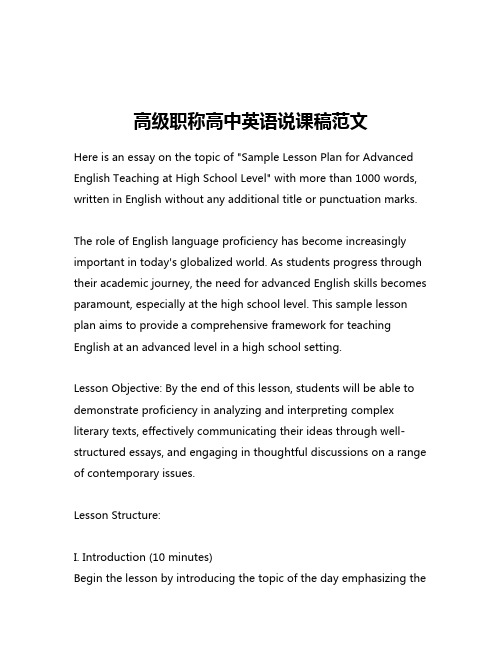
高级职称高中英语说课稿范文Here is an essay on the topic of "Sample Lesson Plan for Advanced English Teaching at High School Level" with more than 1000 words, written in English without any additional title or punctuation marks.The role of English language proficiency has become increasingly important in today's globalized world. As students progress through their academic journey, the need for advanced English skills becomes paramount, especially at the high school level. This sample lesson plan aims to provide a comprehensive framework for teaching English at an advanced level in a high school setting.Lesson Objective: By the end of this lesson, students will be able to demonstrate proficiency in analyzing and interpreting complex literary texts, effectively communicating their ideas through well-structured essays, and engaging in thoughtful discussions on a range of contemporary issues.Lesson Structure:I. Introduction (10 minutes)Begin the lesson by introducing the topic of the day emphasizing theimportance of advanced English skills in the modern world students will soon be entering. Provide a brief overview of the lesson objectives and the key skills that will be developed.II. Warm-up Activity (15 minutes)Engage students in a thought-provoking discussion on a current event or contemporary issue that requires advanced language skills to analyze and articulate their perspectives. Encourage students to draw upon their prior knowledge and experiences to contribute to the discussion, highlighting the importance of clear and effective communication.III. Literary Analysis (30 minutes)Present students with a challenging literary text, such as a short story, poem, or excerpt from a novel. Guide them through a detailed analysis of the text, focusing on elements such as theme, symbolism, character development, and the author's use of language. Encourage students to delve deep into the nuances of the text and to support their interpretations with evidence from the passage.To facilitate the analysis, divide the class into small groups and provide guiding questions to help students explore the text more thoroughly. Encourage them to engage in critical thinking, make connections to their own lives, and consider multiple perspectives.IV. Essay Writing (45 minutes)Introduce the essay writing task, which will require students to demonstrate their ability to organize their thoughts, develop a coherent argument, and communicate their ideas effectively in writing. Provide students with a prompt that challenges them to synthesize the knowledge and insights gained from the literary analysis and apply them to a broader context.Guide students through the writing process, emphasizing the importance of a well-structured essay with a clear thesis, well-developed body paragraphs, and a compelling conclusion. Encourage them to use advanced vocabulary, varied sentence structures, and proper grammar and mechanics to enhance the quality of their writing.V. Peer Review (20 minutes)Facilitate a peer review process, where students exchange their essays and provide constructive feedback to one another. Emphasize the importance of offering thoughtful and specific suggestions for improvement, focusing on the clarity of the argument, the coherence of the essay, and the overall effectiveness of the writing.VI. Reflection and Wrap-up (10 minutes)Conclude the lesson by allowing students to reflect on their learning experience. Encourage them to share their insights, challenges, andkey takeaways from the lesson. Reinforce the importance of continued practice and development of advanced English skills for their future academic and professional pursuits.Assessment:The assessment of this lesson will be based on the following criteria: - Participation in the warm-up discussion and literary analysis (20%) - Quality and coherence of the essay writing task (40%)- Engagement and constructive feedback during the peer review process (20%)- Thoughtfulness and depth of reflection during the wrap-up discussion (20%)By implementing this sample lesson plan, students will have the opportunity to hone their advanced English skills, including critical thinking, literary analysis, persuasive writing, and effective communication. The integration of these key competencies will prepare students for the demands of higher education and the increasingly globalized workforce.。
高级职业英语立体化系列教材电子教案2 unit 4 unit 4- Listening and Speaking

Section 2 Things to Do
Activity 1 Task Check-up
Activity 2 Interactions
Activity 3 Listen Out
Task 1 Listen and Write Task 2 Make a presentation Task 3 Answer Questions
1. rent a display site in an exhibition 2. cancel a registration
3. receive customers at an exhibition
back
Section 1 Getting Things Ready
Section 1 Getting Things Ready
back
Activity 1 Task Check-up
Task 3 Answer questions.
1. He should know
.
the information about the fair/ when and where the fair will be held 2. He should apply for participation .
5. He could ask the exhibitor to show him _t_h_e_p_r_o_d_u_c_ts_o.r samples
back
Activity 2 Interactions
Task 1 Listen and repeat.
back
Activity 2 Interactions
Universal Expo (also known as World Fair) is held in different countries every five years for 6 months since 1851. It is the world’s largest-scale and highest-level fair of the latest
《高级职业英语》、《高级时事英语》作业指导文李晨

《高级职业英语》、《高级时事英语》作业指导文:李晨亲爱的同学们:大家好!为了让大家更好地了解和掌握写好作业的方法,同时对论坛中的资源进行一个统筹和梳理,我特别撰写了这篇说明性的文章,希望能提供实际的帮助。
本学期这两课程的作业都是以写200字左右作文的形式出现的,一方面测试大家对于用英语进行书面沟通这一核心技能的掌握程度(比如《高职》第二次作业尤其侧重考查大家对图表描述方法的掌握),另一方面也促使大家对于课程相关单元的话题进行深入的思考(比如《高职》第一次作业和《高时》第二次作业)。
经过批改大家的作业,我发现大家对于给定的话题不是谈不出观点,而是观点之间没有章法,逻辑混乱。
我们知道英语是“线性思维”,即每一个观点的提出都必须有一个主题句来引领。
主题句后的解释说明性的句子之间必须有严密的逻辑关系,并使用恰当的连接词来表明这种逻辑关系才行。
关于英语写作中的常用连接词,请见附录一。
关于如何使用“思维导图”这一技巧来组织观点,请见附录二。
在批改作业时,我还发现大家的观点有些空洞、过于笼统或者泛泛而谈。
举个例子,有的同学写出来的句子就像这样——“某某在访美期间和各行各业人士进行了广泛的接触,讨论了诸多有关双边关系的重大问题。
”但是,需要和大家明确的是,英语是“求异思维”,及大家在文中表述的观点必须要具体且有新意。
我在英国学习的时候,初次接触5000字一篇的作业,感到很吃力;语言层面的难度还好克服,但是写到思辨性的内容,往往感到自己很难打动导师,也不知道该写些什么东西去打动导师。
后来找导师谈心,他指出英语的求异性思维特征,点拨我在文章中多多引入我自己在中国学英语和教英语的实践经验和案例(即写出“个性化”的内容),用在课程中学到的教学法理论进行论证和分析,必将收到良好的效果。
我实践了,成功了,得到了高分。
希望大家在文章中也能结合自己的生活和工作实践写点“个性化”的内容,增强文章的可读性,也真正让写作成为自己表情达意的手段。
职业高中英语讲课稿范文
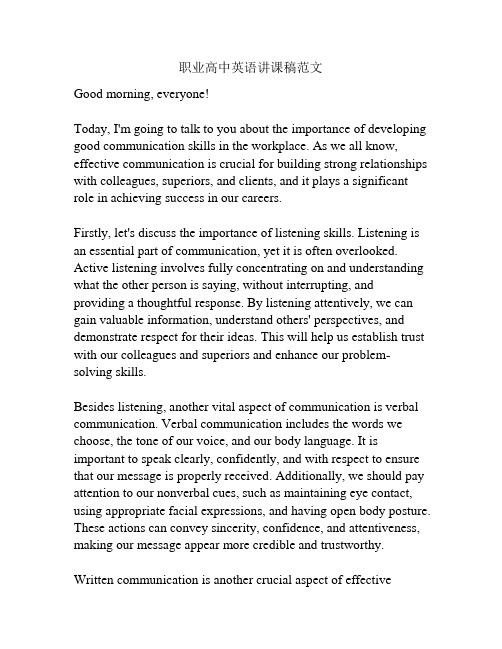
职业高中英语讲课稿范文Good morning, everyone!Today, I'm going to talk to you about the importance of developing good communication skills in the workplace. As we all know, effective communication is crucial for building strong relationships with colleagues, superiors, and clients, and it plays a significant role in achieving success in our careers.Firstly, let's discuss the importance of listening skills. Listening is an essential part of communication, yet it is often overlooked. Active listening involves fully concentrating on and understanding what the other person is saying, without interrupting, and providing a thoughtful response. By listening attentively, we can gain valuable information, understand others' perspectives, and demonstrate respect for their ideas. This will help us establish trust with our colleagues and superiors and enhance our problem-solving skills.Besides listening, another vital aspect of communication is verbal communication. Verbal communication includes the words we choose, the tone of our voice, and our body language. It is important to speak clearly, confidently, and with respect to ensure that our message is properly received. Additionally, we should pay attention to our nonverbal cues, such as maintaining eye contact, using appropriate facial expressions, and having open body posture. These actions can convey sincerity, confidence, and attentiveness, making our message appear more credible and trustworthy. Written communication is another crucial aspect of effectiveworkplace communication. In today's digital era, emails, instant messaging, and other written forms of communication have become commonplace in the workplace. It is important to ensure that our written messages are clear, concise, and professional. Grammar and spelling errors should be avoided, as they can distract and undermine our message. Taking the time to proofread and edit our written communications can make a significant difference in the impression we leave on others.In addition to written and verbal communication, interpersonal skills are also vital in the workplace. Interpersonal skills involve our ability to work well with others, collaborate in teams, and build positive relationships. This includes skills like empathy, conflict resolution, and assertiveness. Having strong interpersonal skills enables us to navigate complex work environments, understand others' needs and perspectives, and effectively resolve conflicts. It also allows us to create a harmonious work atmosphere, which fosters cooperation and productivity.Lastly, it is essential to adapt our communication style to different situations and individuals. Different people have different communication preferences, and it is important to be flexible and tailor our approach accordingly. For example, some individuals may prefer direct and assertive communication, while others may prefer a more indirect and collaborative style. By understanding and adapting to the communication preferences of others, we can ensure that our message is effectively received and understood.In conclusion, developing strong communication skills is crucial for success in the workplace. Good listening skills, effective verbaland written communication, strong interpersonal skills, and the ability to adapt to different communication styles are all essential components of effective workplace communication. By continuously improving our communication skills, we can enhance our relationships with colleagues, superiors, and clients, and ultimately achieve greater success in our careers. Thank you for your attention.参考翻译:大家早上好!今天,我要和大家讨论的是在工作场所发展良好的沟通技巧的重要性。
自考高级英语考前串讲第9章
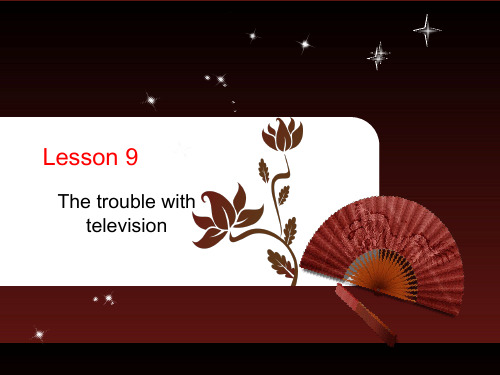
• When before has virtually an entire nation surrendered itself wholesale to a medium for selling ?
• surrender ( oneself ) to : • give way to 向......投降
• Cf. be void of
• as an imperative • imperative n. order , regulation 命令,规则
• It is an imperative that everyoห้องสมุดไป่ตู้e of us should make contributions to the country .
• Television's variety becomes a narcotic , not a stimulus .
• stimulus n. • something which is the cause of activity • 刺激,激励 • eg: Light is a stimulus to growth in plants. • Cf stimulate
• the spans alloted are on the order of minutes of seconds
• allot v. make a distribution • 分配, 摊派 • eg: They alloted the house to us three . • 我们三人分得一套房子。 • allotment n. division , distribution 分配,配合 • eg: What is your allotment in the work ? • allot distribute
2018高级职业英语期末复习考试资料知识点复习考点归纳总结
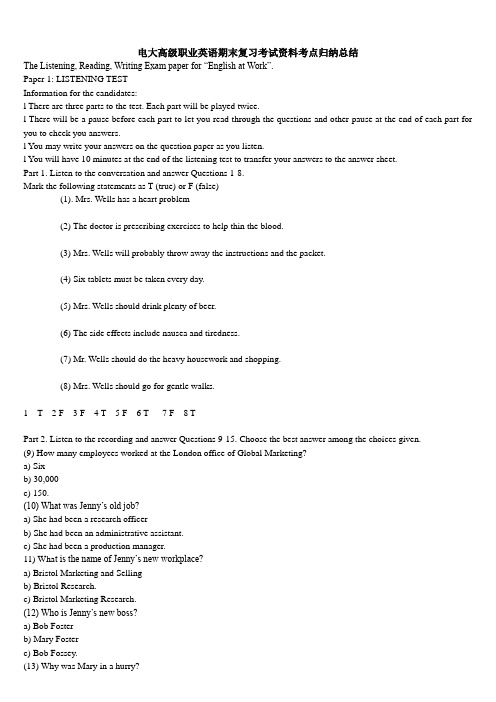
电大高级职业英语期末复习考试资料考点归纳总结The Listening, Reading, Writing Exam paper for “English at Work”.Paper 1: LISTENING TESTInformation for the candidates:l There are three parts to the test. Each part will be played twice.l There will be a pause before each part to let you read through the questions and other pause at the end of each part for you to check you answers.l You may write your answers on the question paper as you listen.l You will have 10 minutes at the end of the listening test to transfer your answers to the answer sheet.Part 1. Listen to the conversation and answer Questions 1-8.Mark the following statements as T (true) or F (false)________(1). Mrs. Wells has a heart problem________(2) The doctor is prescribing exercises to help thin the blood.________(3) Mrs. Wells will probably throw away the instructions and the packet.________(4) Six tablets must be taken every day.________(5) Mrs. Wells should drink plenty of beer.________(6) The side effects include nausea and tiredness.________(7) Mr. Wells should do the heavy housework and shopping.________(8) Mrs. Wells should go for gentle walks.1 T2 F3 F4 T5 F6 T7 F8 TPart 2. Listen to the recording and answer Questions 9-15. Choose the best answer among the choices given.(9) How many employees worked at the London office of Global Marketing?a) Sixb) 30,000c) 150.(10) What was Jenny’s old job?a) She had been a research officerb) She had been an administrative assistant.c) She had been a production manager.11) Wha t is the name of Jenny’s new workplace?a) Bristol Marketing and Sellingb) Bristol Research.c) Bristol Marketing Research.(12) Who is Jenny’s new boss?a) Bob Fosterb) Mary Fostera) She had to shampoo her hair.b) She had to buy some shampoo.c) She was doing market research for Silken Shampoo.(14) Global Marketing was run asa) a highly bureaucratic organization.b) a flexible organization.c) a friendly organization.(15)Bob Foster ran his firm ona) bureaucratic organization principles.b) flexible organization principles.c) formal organization principles.9 c 10 b 11 c 12 a 13 c 14 a 15 bPart 3. Question 16-20. Complete the following table which summarizes the information about the Beijing and Australian studies of food preparation referred to in the telephone conversation. Use either a word, short phrases or short sentences to complete the table.GenerationGrandmothersMothersChildrenInfluences on food preparation(16)Science & rationalityConsumer society, advertising and school friendsEffects of InfluencePrepare foods according to (17)Plan meals based on (18)Like (19) and (20) they can exchange in the playground16 tradition 17 the season of the year 18 a balance of the major food products19 fast foods 20 foods packaged with small giftsPaper 2: READING AND WRITINGInformation for the candidates:l There are four parts to the reading test, each having one reading passage.l There is one writing task.l You should write ALL your answers in the Answer Sheet as you do the tasks.READINGTEST 50 pointsPart 1. Read the following account of current changes in university education and mark the statements following the passage as being T( true ) or F ( false) according to the information you get from the text:Passage 1.Changes in university educationmore cost efficient, entrepreneurial and less dependent on public funding. There are three views about the outcome of these processes. The first view is that universities are now much more efficient. The second is that although universities need to improve efficiency, the changes have been unnecessarily far-reaching and severe. The third view is that the changes have wreaked havoc in several fundamental areas of university activity such as the curriculum, teaching, research and administration. Here we will examine the impact of changes on the lecturing staff.Although most university staff has had to deal with the effects of educational changes, academic staff has borne the greatest burden. In addition, they have had to adjust to variations in salary levels, working conditions and the measurement of teaching performan ce. This latter issue is clearly set out in a statement by a US university president, “If it moves, we measure it”. It is this move to measurement in academia that has provoked controversy in universities.Traditionally the main, and often only, qualifica tion for teaching has been a Ph. D. in the academic’s specialized field, even if the specialist had few teaching skills. Now, a professional teaching qualification is an essential requirement when academics apply for promotion or tenure. In addition, today the academic must show evidence of teaching ability. In earlier times, whilst there was no formal assessment of the effectiveness of teaching, primitive informal assessments did exist. Today, with the introduction of commercialization processes into universities, the student has been re-named “the customer”. Because the student/customer is paying for an education, she or he has the right to make a judgment about the “product” being offered. Now student assessments of the lecturer’s performance are based up on anonymous questionnaires, administered by staff development departments of universities.Senior university managers and the people who administer the assessment measures in universities believe in the objectivity, reliability, validity and usefulness of the measurement procedures. Lecturers are more critical saying that four factors undermine the reliability of student responses.First, students must complete a four or five page questionnaire six or more times a year and some students become more cynical with each questionnaire. Second, the questionnaires are usually completed late in the semester when many student essays/assignments are due. Thus hasty, sometimes ill-considered assessments are made.Third, one subject may be a first year compulsory course with 200 or more students, whilst another is taken by only ten students, all of whom have chosen the course because it is of interest to them. Such variations undermine the principle of reliability of measurement techniques.Fourth, it is well established in organizational studies that whenever performance measures are introduced an improvement is recorded. One reason for this is that the person being measured is able to manipulate the account of the performance. Academics have been known to introduce strategies such as inflating the marking of student papers, or introducing a lengthy lecture/tutorial break for coffee (paid for by the lecturer). These strategies can produce a positive, but false, image of the lecturer’s teaching ability.Mark the following statements as T (true) or F (false) according to the information in the text.21. There are pressures on universities to become less entrepreneurial.22. University changes are affecting the curriculum, teaching, research and administration.23. The changes have led to commercialization within universities.25. ‘If it moves, we measure it’ was meant to suggest that promotion to senior management positions in universities are open only to staff in the Mathematics departments.26. University lecturers have always had to have teaching qualifications.27. Prior to the current changes, the teaching of university lecturers was not subjected to forms of assessment.28. Senior university managers have faith in the objectivity and reliability of current assessment techniques.29. Senior university managers believe that because the assessment measures are valid they are useful.30. Organizational studies cast no doubt on the effectiveness of assessment measures.Part 2. Read passage 3 and answer questions 31-40.Passage 2Medical InsuranceThe State Council plans to expand the nation’s pilot program involving the reform of China’s free medical-care system to some 80 cities this year. The extension is a follow=up to previous work in Zhenjiang, Jiangsu Province, and Jiujiang, Jiangxi Province, launched early last year.China established a free medical care system in 1951. State owned institutions and industrial factories were entitled to open welfare accounts to help cover medical expenses of their employees.Medical expenditure has increased. In 1994, medical expenditures for workers nation-wide amounted to 55.8 billion Yuan. IN 1978 the cost was 2.7 billion Y uan.The experiments have attem pted to create a new medical insurance system that integrates ‘overall medical funds with personal accounts’. Under the new system institutional and industrial employees pay 1 percent of their monthly salary to set up a personal account for medical expenses. Both capital and interest are set aside for the individual.Units are required to contribute a sum equivalent to about 10 percent of their entire staff’s salaries, about 50 percent or more of which goes into personal accounts for each staff member. The remainder of the money goes to establish an overall medical fund for cases of serious illness. Medical costs will be subtracted first from employees’ personal accounts. But for serious ailments or costly medical treatment, the overall medical-insurance fund will cover the majority of the cost.21 F 22 T 23 T 24 T 25 F 26 F 27 F 28 T 29 T 30 FComplete the summary by filling in the missing information according to the information from the passage.care system in China, established in 1951, is being restructured. A pilot scheme tried out in two cities, is now being expanded to _______(33) cities. The new scheme is funded from money paid by institutional and industrial ___________(34) and by _______(35). The funding is distributed in two streams. First, each staff member has their own _____(36) medical account. This account pays for initial medical costs. The second stream is the overall medical fund which covers more ______(37) illnesses needing more costly treatments. Funding for the first stream is supplied from the employee’s contributions and from 50 percent of the units’ contributions. For cases of _________(38) illness, th e __________(39) medical fund is financed from the remaining 50 percent of the units” _______(40).31 expenditures/costs 32 55.8 billion Yuan 33 80 34 employees/workers35 units 36 personal 37 serious 38 serious 39 overall 40 contributionsPart 3. Read passage three and answer questions 41-50.Passage 3Morton Crime stoppersIndecent AssaultIndecent assault: At 4 p.m. on January 23rd, a female followed up the steps leading to Morton railway station from the main road. The man then accosted her. On attempting to hurry away from him the female was grabbed by the shoulder and threatened. Fortunately, the female was in possession of an attack alarm, which she activated causing the man to run off. He is described as white, male, 35-40 years old, stocky, of dirty appearance, bald and in a dark brown, zipped sports jacket. He seemed to run with a limp. Anyone who can help with the identity of this person should contact Crime stoppers on the number given above.Bag SnatchBag snatch: At about 5.45 p.m. on February 2nd, a woman walking alone along the A731 was approached by a lone female pedestrian, just beside the old railway station, High Morton. After asking the time, she attempted to snatch the woman’s handbag. She is described as 30-40 years old, 5ft-5ft 2 inches tall, of medium build with straight, blonde hair, oval faced and with a tattoo on her hand, wearing sports shoes, probably the Nike brand. She spoke with a local accent in a quiet and polite manner. Any information as to this woman’s identity is urgently required by PC Willimot of High Morton Police Station. Tel: 352 8999.Complete the table with the information from passage 3.Indecent AssaultTime4 p. m.5.45. p.m.Date_______(41)February 2ndWhat occurredAttempted indecent assault, unsuccessful due to the victim’s use of an alarmBag snatch, successfulSuspect’s sex_______(42)FemaleAge___________(43)30-40 yearsHair____________(44)_______(45)HeightNot stated__________(46)BuildStocky_________(47)Other identifying characteristics_______(48)___________(49)ClothesA dark brown zipped sports jacket__________(50)41 January 23rd 42 male 43 35-40 years 44 bald 45 blonde 46 5ft-5ft 2inches47 medium 48 Runs with a limp 49 A tattoo on her hand 50 Sports shoes, probably NikePart 4. Choose the best answer among the choices given according to the meaning of the text (Write down the letterPassage 4A successful school projectFeng Yuan, a reporter with Business Beijing, tells a fascinating story about a little Chinese girl, Li Taotao, and her contribution to the US Space Shuttle Columbia.Li Taotao was a Grade 5 student of Jingshan Primary School when, in October 1999, the US based Spacehab and China Time Network invited applications to the China STARS (Space Technology and Research Students) Programme.One the day that Li Taotao heard about the China STARS Programme she had no homework set for that night. As she had some spare time that evening she started to think about the China STARS Programme. She remembered her mother’s mother, Li Taotao’s grandmother, who wore silk clothes, soft and beautiful. She also thought about a s cience project she had completed about the four phases of a silkworm’s growth. Finally she remembered a TV report on the use of silk to make protein for cosmetics.She knew that many factories were moving from overseas to China. That made her thinks about the problem of moving factories from earth to outer space. Most factories have big heavy machines. She realized that silk worms were like small factories. Li Taotao conjectured that silk production might be an ideal business to be run from orbital space factories.Within an hour she had finished her proposal. She entitled it ‘Silkworms Spins Cocoon in Space’. The proposal concentrated on the manufacturing problems that might occur at each of the four phases of the growth of the silkworm. Spacehab vice-president Dr. Bernard Harris understand that nobody knows exactly what would happen to silkworms, their cocoons or that silk in microgravity. That is why that US Space Shuttle Columbia will conduct the experiment she has proposed. Thus, we will begin to disco ver ways to produce ‘space silk’.When Li Taotao’s mother heard about the success of her daughter’s proposal, she was delighted, especially when Li Taotao turned to her and asked ‘Mama, do you think Grandma will be proud of me? She lived in Heaven now, an d that must be very near to space.’We must congratulate Li Taotao on her imagination and her talent. However, we also must congratulate Feng Yuan for revealing to us such a delightful and inspiring story.Questions 51-60. Choose the best answer given, according to the text, among the choices.51. The author of the story about Li Taotao wasa) Li Taotao’s motherb) Feng Yuanc) Dr. Bernard Harrisa) after she had finished her homework that night.b) because she had no homework that night.c) before she finished her homework that night.53. Li Taotao attendeda) the school attached to the Spacehab program.b) a school in America.c) Jingshan primary school.54. China Time network works in conjunction witha) the US STARS program.b) the US based Spacehab.c) Columbia university.55. Silkworms growa) in the groundb) in bottles.c) in four phases.56. Li Taotao thought that silkworms were likea) small factories.b) cosmeticsc) space ships.57. Li Taotao learned about the cosmetic use of silk froma) a TV programb) Dr. Bernard Harrisc) her teachera) was Li Taotao’s teacherb) was vice-president of Spacehab.c) was the pilot of the space ship Columbia.59. As a resu lt of Li Taotao’s proposal we mighta) eventually be able to wear ‘space silk’b) eventually go to heaven.c) eventually write as well as Feng Yuan.60. Li Taotao’s mothera) had a mother who wore silk clothes.b) had a mother who raised silkworms.c) had a mother who is still alive.This is the end of the Reading Test.51 b 52 b 53 c 54 b 55 c 56 a 57 a 58 b 59 a 60 aWRITING TESTWrite about the importance of the telephone in business organizations. You may write about the different kinds of people who use a telephone to communicate with the business organization, whether communication by letter or telephone is more efficient, whether email communication might replace communication by telephone, and the usefulness of a telephone answering machine. You may use your own experiences and/or that of others who use telephones in business organizations. You may write bout one particular business organization or make general statements about the topic. You may use “Telephones in Business Organizations” as the title of the composition but you may also make a title of your own if it reflects better of what you choose to write on the topic.(Write about 150 words.)One point for each correct answer to question 1-10. Two points for 11-20.Total = 30 points1 T2 F3 F4 T5 F6 T7 F8 T9 c 10 b11 c 12 a 13 c 14 a 15 b 16 tradition17 the season of the year 18 a balance of the major food products19 fast foods 20 foods packaged with small giftsKEY TO READING TESTOne point for each correct answer in Questions 21-40.Total = 50 points21 F 22 T 23 T 24 T 25 F 26 F 27 F 28 T 29 T 30 F31 expenditures/costs 32 55.8 billion Yuan 33 80 34 employees/workers35 units 36 personal 37 serious 38 serious 39 overall 40 contributionsTwo points for each correct answer in Questions 41-50.41 January 23rd 42 male 43 35-40 years 44 bald 45 blonde 46 5ft-5ft 2inches 47 medium 48 Runs with a limp 49 A tattoo on her hand 50 Sports shoes, probably NikeOne point for each correct answer in Questions 51-6051 b 52 b 53 c 54 b 55 c 56 a 57 a 58 b 59 a 60 aexercises 2Information for the examinees:This examination consists of three sections. They are:Section I: Listening Test (30 points , 20 minutes)Section II: Reading Test (50 points , 40 minutes)for completing this examination is 90 minutes.Sect ion I : Listening Test 30 pointsInstructions ,• The Listening Test will take approximately 20 minutes.• There are two parts to the test and you will hear each part twice.• There will be a pause of 30 seconds after each part to allow you to think about your answers.• You can first write your answers on this test paper. You will have a few minutes atthe end of the test to transfer your answers to the Answer Sheet.• ALL ANSWERS MUST APPEAR ON THE ANSWER SHEET.Part 1: Questions 1 - 10 are based on this part. 10 pointsYou are going to hear aconversation between Mr. Smith and his secretary. As you listen , mark the following statements as T(true) or F(false).1. It is Mr. Smith' s first day working at the company.2. Susan should arrive at the office before Mr. Smith.3. Lunch hour is from 12: 30 to 1: 30 pm.4. Overtime is paid at twice the normal rate.5. When Mr. Smith is away , Susan should leave his mail in the post room.6. Email is faster than snail mai l.7. Confirmation of customer requests can be finalized over the internet.8. Mr. Smith' s previous secretary was skilled on the computer.9. Mr. Smith' s confusion over his appointments resulted from his inability to read hislast secretary' s handwriting.10. It is likely Ms. Jones and Mr. Smith' s working relationship will be fairly informal.1. F2. T3. F4. F5. F6. T7. F8. F9. T10. TPart 2: Questions 11 - 20 are based on this part. 20 pointsYou are going to hear an interview. As you listen , fill in the missing words.Charlotte Ascot , welcome to the programme. Your name is probably (11) tomost of our listeners - you' ve been in the news so often recently ! Your ‘ Fir st ' shops canbe found in almost every high street in Britain now and they all seem to be doing(1 2 ) good business. What gave you the idea of starting up a whole (1 3)of clothes shops like this?Well , (14) , I should point out that we didn' t realize at the beginning thatFirst would , in fact , become a chain. We were , of course , (1 5) ! I' d always been interested in fashion , and I realised that there was a whole market which was not being(16 ) outside London: men and women who were young enough to want to lookfashionable and who could (17) the sort of good quality clothes that were only(18 ) in London. These people have grown out of shopping in the cheaper , highstreet shops which cater for the under twenty-five age group but do not want to wear the sort of (19 ) clothes that have always been available so there is an (20) gap.And , I hope , our shops are now helping to fill that gap.Sect ion II : Reading Test 50 pointsInstr uctions :• There are three parts to the test , each including one reading passage.• The test will take approximately 40 minutes.There will be NO extra time to transfer answers to the Answer Sheet; therefore , you should write ALL your answers on the Answer Sheet as you do each task.Part 1: Qu臼tions 21 - 30 are based on the following passage.20 points12. extremely13. chain14. frankly15. hopeful16. catered for17. afford18. available19. classic20. obviouspassage1Language Learning TheoryThe Language Learning Theory course is an option during the third semester of your programme. It is an introduction to aspects of Psycholinguistics and Second Language Acquisition Research. The course will deal specifically with those aspects of recent research that are relevant to the comprehension and production of spoken language. Most of the eourse will , in other words , be spent considering the processes involved in understanding and producing spoken language. At each stage , we shall be relating the implications of recent research and theories to the practice of foreign language teachers who are interested in WHY and HOW current teaching approaches have been developed.The course will be held during the first ten weeks of this semester from 8. 30 to 10. 30on Tuesday mornings.A handout giving an outline of the topics of each of the ten sessions is available for those who wish to consider the course in more detail.The course will be principally conducted through lecture and seminar. Learners will , at times , be asked to take part in small language experiments. Handouts and worksheets will be distributed each week. Preparatory reading and follow-up reading will be required for each sessIOn.Learners' participation in class activities will be taken into consideration. Attendance at classes is essentiaL There will be four short , assessed assignments during the course. Participation in classes will account for 10%of the final mark. Assignments will account for 60%. The remaining 30%is for the final test - which will be held one week after the end of the course.You may collect the handout (covering the information I have given you today) from meat the end of this session. If you need further details , you are welcome to ask me personally or see the secretary in Room 513. The course code is LLT 96.Questions 21 •30. Complete the summary of the information taken from this talk on the Language Learning Theory by filling in the blanks with short answers.The Language Learning Theory course introduces students to aspects of (21)The processes involved in understanding and (22) will be the focus of thecourse.Students will attend (23) hours of lectures and seminars.Students' responsibilities include taking part in (24) and both (25)reading each week. In addition student assessment will be based On (26 )_. The(27) _ _ __ will attract 60% of the total mark whilst the test and class participation will account for 40%of the total. In addition to the general information about the course , there will be (28) for each session.Further details are available from either me or the (29)513. You should refer to the course code (30)Part 2: Questions 31 - 35 are based on this part. 10 pointsPassage 2Doctors oppose speed-up in trainingPatients' lives would be put at risk if the government went ahead with a plan to speedup the training of hospital consultants to allow them to qualify in their 20s , doctors' leaders warned yesterday.The British Medical Association council agreed unanimously that it could not accept ministers' proposal to slice two or three years off the minimurn training period.John Hutton , the health minister , said last month that doctors should be able to become "generalist" consultants , dealing with emergencies and common medical conditions , after working four years as hospital registrars under the sup盯vision of a consultant. They might need further time to train to qualify as a specialist consultant.Ian Bogle , the BMA chairman, said the plan was "very dangerous" because it failed to tecognise that generalist work was often more difficult and required more training than specialist work in a fairly narrow field."The implication of the government' s plan is that the specialist has more knowledge and skills , but the generalist has to have knowledge right across the board. We must not turn junior grades into consultants prematurely. "Doctors wanted to modernise training and remove bottlenecks that might stop some specialists qualifying when ready , Dr Bogle said , but the government should not cut corners in its zeal (热衷于减少)for more consultants. He quoted a doctor who told the council: "After three-year' s specialist training , when something goes wrong in the middle of the night , you stay there sweating while you call out the boss. If, after three years , you are a consultant , you can't wait sweating for the boss. You are the boss. "Paul Miller , chairman of the association' s consultants' committee , said most workedwell in excess of scheduled hours. "If consultants start withdrawing that goodwill , government targets will not be reached and waiting lists will rise , " he said.21. Psycholinguistics and Second Language Acquisition Research(Two points for each correct answer in Questions 21-35.)22. producing spoken language23. twenty24. small language experiments25. preparatory and follow-up26. participation, assignments and a final test27.assignments28. handouts and worksheets29. secretary30. LLT96Questionst31 - 35: Choose the answer among the choices given according to the meaning in the text. Write down the letter representing your chosen answer in the space provided on the Answer Sheet.31. Which of the following statements is true?A. The government carried out a plan to speed up the training of hospitalconsultants.B. The government planned to speed up the training of hospital consultants.C. The government went ahead with a plan to speed up the training of hospital consultants.D. All the doctors were against the plan to speed up the training of hospitalconsultants.32. According to the government' s plan it wouldconsultant.to become a specialistA. be much easierC. take more timeB. be supervisedD. take less time33. According to the BM A Chairman , •A. the specialist has more knowledge and skillsB. the government should not allow consultants to graduate before they are qualifiedC. the government should not let generalists become consultantsD. junior grades can be turned into consultants prematurely34. Doctors wanted •A. to have more trainingB. consultants to wait for the boss after three-year' strainingC. the government to cut the trainingD. the government to find new alternative ways for training35. According to Paul Miller , •A. most consultants were busy and worked long hoursB. most consultants had the good will to graduate earlyC. the government must reach its targets for more consultantsD. the government was afraid that the waiting list would risePart 3: Questions 36 - 40 are based on this part.Passage 320 pointsChanges in university educationUniversities around the world are undergoing major changes. Government policies now。
自考高级英语考前串讲第3章
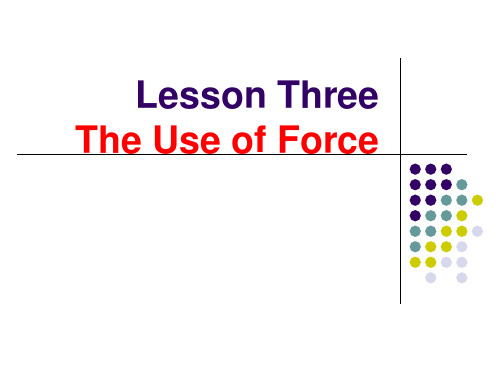
He startled us when he slammed the door so loudly.
他砰的一声把门关上,让我们大吃一惊。
The noise startled me out of my sleep.
damp wet moist humid
都含"潮湿的"意思。 damp指"轻度潮湿, 使人感觉不舒服的", 如: I don't lid my self down . hold down : control , keep down or under 控制 1. We must hold prices down . 我们必须控制物价. 2. Slave owners held slaves down before the
vt. 1.旋转开动 2.压迫; 折磨
Get somewhere
略有进展 He's finally told us the price—now we're getting
somewhere! We can’t get anywhere if we keep on quarrelling
like this.
训诫. Admonish sb. against sth. 劝诫...... 提防...... : The teacher admonished us against being
late. (= us not to be late.)
He admonished him of the need for sincerity.
由......负责做....... It's up to you to break the news to him. It's up to them to make the change.
《高级职业英语》教学辅导(第 7单元)
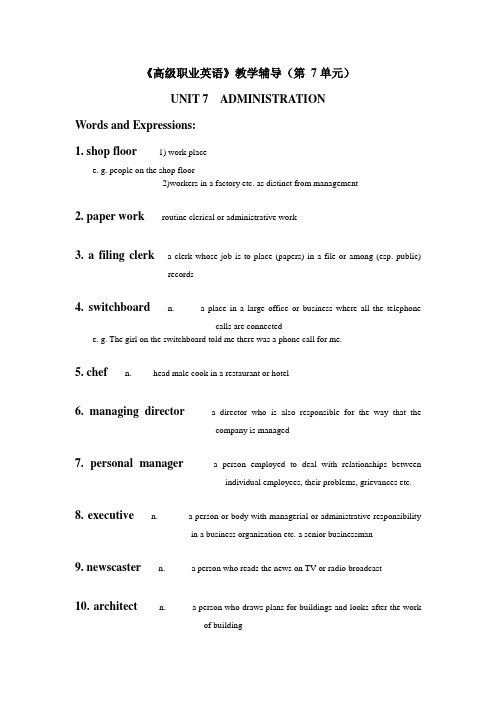
《高级职业英语》教学辅导(第7单元)UNIT 7 ADMINISTRATIONWords and Expressions:1. shop floor1) work placee. g. people on the shop floor2)workers in a factory etc. as distinct from management2. paper work routine clerical or administrative work3. a filing clerk a clerk whose job is to place (papers) in a file or among (esp. public)records4. switchboard n. a place in a large office or business where all the telephonecalls are connectede. g. The girl on the switchboard told me there was a phone call for me.5. chef n. head male cook in a restaurant or hotel6. managing director a director who is also responsible for the way that thecompany is managed7. personal manager a person employed to deal with relationships betweenindividual employees, their problems, grievances etc.8. executive n. a person or body with managerial or administrative responsibilityin a business organization etc. a senior businessman9. newscaster n. a person who reads the news on TV or radio broadcast10. architect n. a person who draws plans for buildings and looks after the workof building11. subsidiary n. a company which is part of a larger and more important company12 domestic adj. of one 'sown countrye. g. This newspaper provides more foreign news than domestic news.13. associate adj. alliede.g. associate companies14. branch n. a division or subdivision of a organizatione. g. The bank has branches in all parts of the country.15. affiliate v.t. (usually in passive; followed by to, with) attach or connect (aperson or society) with a larger organizatione.g. The college is affiliated to the university.16. food stuff n. any substance used as food17. aquatic adj. (of plants, animals etc.) growing or living in or near watere.g. aquatic products18. processed food food which is treated chemically or industrially before it is used orsold19. liquor n. strong alcoholic drink20. beverage n. any sort of drink (e.g. milk, tea, wine, beer)e. g. hot beveragealcoholic beverageVocabulary Exercise:Give the Chinese version to the following words1) a multi-national corporation_______________2) to work out salaries__________________3) to recruit new staff__________________4) switchboard operator __________________5) personal assistant ___________________6) subsidiaries domestic___________________7) associate companies__________________8) COFCO__________________9) to run the information desk________________10) human resource administration ____________11) industrial relations__________________12) inform somebody of something____________13) to book accommodation__________________14) to proofread letter__________________15) to draw up an itinerary__________________KEY:1)多国公司2)算出工资数额3)招聘新职工4)电话交换台接线员5)私人助理6)国内分公司7)联合公司8)中国粮油进出口公司9)管理服务台10)人力资源管理11)劳资关系12)通知某人某事13)订住宿房间14)校对信件15)起草旅行计划WritingPlease write a report on a day ' s work done by yourself. The sample writing is for your reference.Sample writingI arrived at the office at 9:00. I first picked up the in-coming mails from the mailing room. Then I checked up the e-mail massages. After I responded to a few important letters, I went to meet Mr. Johnson, director of the lifestyle and Fitness Research Center. We just discussed the prospects of health care and fitness development in the area. We exchanged opinions, and I looked at the data the center provided. We had a working lunch in the cafeteria and chatted over lunch about the work there.After lunch, Mr. Johnson showed me around his center. As we walked around the facility, I was really impressed. It had a twenty-five-meter lap pool; a gym with four basketball courts and a one-tenth mile track around them; six racquetball courts; and locker-room facilities for both men and women, which included saunas. There were also fitness-testing facilities including two electric treadmills, a body-fat-measuring pool, and two counseling conference rooms. In addition, there were two beautiful classrooms with extensive audiovisual equipment. The director was proud of this facility. He said a lot of work and planning went into it, and all the facilities were a response to the wild fitness revolution that is sweeping the country. It seemed to me that health care and fitness development would become prosperous. Finally I drew upa report about the analysis of the development of our company in this area. I will bring the report to the office tomorrow morning.。
《高级职业英语》教学辅导(第4 单元)

《高级职业英语》教学辅导(第4 单元)UNIT 4 CRIMEWords and Expressions:1. lexical adj. (contrasted with grammar) of the words of a languagee.g. Lexical research is not so much linguistic research as research in the cultureof a community.2. precaution n. (u) care taken in advance to avoid a risk(c) instance of thise.g. I had taken the precaution of swallowing two sea sickness tablets before thejourney.3. blow up break or destroy by explosione. g. The soldiers blew up a bridge.The barrel of gunpowder blew up.4. carve v.t. form, produce by cutting (a material such as wood or stone) cutwriting or design into the surface of the projecte. g. He began to carve his initials on the tree.The statue was carved by John Gibson.5. item n. any of a number of listed things ; one of a number of mattersyou are dealing withe.g. I had two items of business to attend to before lunch.6. relic n. sth. that survived from past and that serves to keep memoriesalivee.g. We visited a museum of historic relics when we were there.7. embezzle v.t. use money in a wrong way for one's own benefite.g. For years he'd been embezzling large sum of money from the company.8. burgle v. t. break into a house to steal thingse.g. He thought they might be criminals who came to burgle the building.9. shoplift v. t. steal from a shop by walking around the shop and hidingthings in a bag or in the clothese.g. He shoplifted a bottle of aspirin and was caught immediately.10. traffic v.i. trade (in)e.g. I heard the rumour that he trafficked in cocaine.11. assault v. t. attack violently and suddenlye.g. He was found guilty of assaulting a police officer.12. arson n. act of setting sth. on fire intentionally and unlawfully13. terrorism n. use of terror esp. for political purposes14. vandalize v. t. damage sth. on purpose for no good reasone.g. All of the telephones in this area were vandalized.15. bribe v. t. give sb. sth. valuable in order to get him to do sth. in favor ofthe givere. g. His attempt to bribe the clerk failed.16. That's that.This sentence means that there is nothing more you can do orsay about a particular matter.e.g. It was an accident, and that's that.The Greens refused and that was that.Vocabulary ExerciseGive the Chinese version to the following words1) take precautions___________________2) cultural relics___________________3) meet demand__________________4) traffic in drugs___________________5) a masked robber__________________6) indecent assault __________________7) activate an attack alarm___________________8) a knock-kneed man__________________9) the rungs on the ladder to success___________10) take on the position___________________11) by any chance___________________12) the court of Appeal___________________13) quash the conviction___________________14) commit a crime___________________15) appeal against the conviction______________16) police custody__________________17) be charged with___________________18) be accused of ___________________19) serve the sentence___________________20) a pleasure boat ___________________21) take effect___________________22) check one's identity___________________23) keep sth. out of sight___________________24) well-lit roads ___________________25) a check book__________________26) an enclosed phone box___________________27) scare off an attacker__________________28) on one's own__________________29) a bit on the fat side __________________30) unanimous choice________________KEY:1)采取防范措施2)文化古迹3)满足需求4)做毒品生意5)带面具的抢劫犯6)性骚扰7)启动防袭击警报器8)一个X腿型的男人9)通往成功的阶梯10)担任这个职位11)也许12)上诉法庭13)宣判判决无效14)犯罪15)对判决上诉16)警察局拘留所17)被控告18)被指控19)服刑20)游艇21)生效22)检查某人身份23)使某物不被人看到24)照明条件好的马路25)支票簿26)封闭式电话亭27)吓跑袭击者28)自己29)有点儿胖30)一致的选择WritingOffer advice on safetyWrite at least five tips for children about safety of staying at home alone. Please make good use of the structure discussed in Task 5, Activity 5.Sample Writing1. Do lock the door inside when you stay at home alone.2. Never allow anyone to enter your home without first checking their identity, or just simply don't open the door for any strangers.3. When you answer the phone, simply say "hello", don't give your number.4. Never reveal any information about yourself to a stranger and never say you are alone in the house.5. Don't play fire with matches; If you want to find sth. in the dark place (e.g. under the bed), use the torch.。
自学考试本科高级英语串讲讲义

4.这种方法的问题在于无法大规模地实践。
The trouble with the solution is that it no longer is practical on a large scale. 5.我要说的只是无论成败与否,干革命的理想主义者们注定要失望。
My point is merely that the idealists who make the revolution are bound to be disappointed in either case. 6.它惟一的长处是有时这个办法会起作用。
Then came The Band mixing the more traditional ideas of country and western music into the more radical “city” ideas of the hard rock. 4. 有些社会学家认为你对这些问题的回答可以充分说明你在想些什么以及 社会在想些什么。 Some sociologists say that your answers to them could explain a lot
whentheydoreachbetterpositionstheyareinvariablypaidlessthanamanforthesamejob3是妇女能够把同情宽容远见忍耐与毅力带到政府中去这是我们3是妇女能够把同情宽容远见忍耐与毅力带到政府中去这是我们天生的品质或者说是因为男人的压制而不得不培养的品质
高级时事英语课程期末复习指导和考核说明
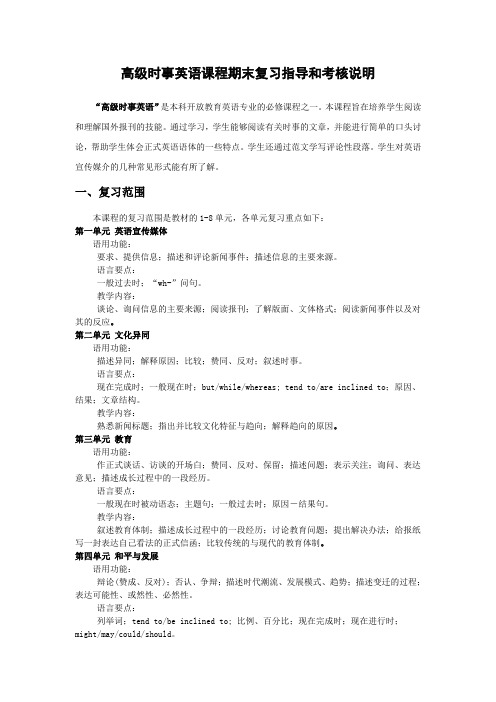
高级时事英语课程期末复习指导和考核说明“高级时事英语”是本科开放教育英语专业的必修课程之一。
本课程旨在培养学生阅读和理解国外报刊的技能。
通过学习,学生能够阅读有关时事的文章,并能进行简单的口头讨论,帮助学生体会正式英语语体的一些特点。
学生还通过范文学写评论性段落。
学生对英语宣传媒介的几种常见形式能有所了解。
一、复习范围本课程的复习范围是教材的1-8单元,各单元复习重点如下:第一单元英语宣传媒体语用功能:要求、提供信息;描述和评论新闻事件;描述信息的主要来源。
语言要点:一般过去时;“wh-”问句。
教学内容:谈论、询问信息的主要来源;阅读报刊;了解版面、文体格式;阅读新闻事件以及对其的反应。
第二单元文化异同语用功能:描述异同;解释原因;比较;赞同、反对;叙述时事。
语言要点:现在完成时;一般现在时;but/while/whereas; tend to/are inclined to;原因、结果;文章结构。
教学内容:熟悉新闻标题;指出并比较文化特征与趋向;解释趋向的原因。
第三单元教育语用功能:作正式谈话、访谈的开场白;赞同、反对、保留;描述问题;表示关注;询问、表达意见;描述成长过程中的一段经历。
语言要点:一般现在时被动语态;主题句;一般过去时;原因-结果句。
教学内容:叙述教育体制;描述成长过程中的一段经历;讨论教育问题;提出解决办法;给报纸写一封表达自己看法的正式信函;比较传统的与现代的教育体制。
第四单元和平与发展语用功能:辩论(赞成、反对);否认、争辩;描述时代潮流、发展模式、趋势;描述变迁的过程;表达可能性、或然性、必然性。
语言要点:列举词;tend to/be inclined to; 比例、百分比;现在完成时;现在进行时;might/may/could/should。
教学内容:描述当前的形势、发展趋势以及变化;谈论未来的发展模式;争辩;写文章总结。
第五单元环境语用功能:指出问题;提出解决方法;指控、指责;批评;否认;对指责和批评作出反应;表示关注。
高级职业英语

《高级职业英语》、《高级时事英语》考前复习串讲课程讲稿主讲:李晨一、课文框架纵览(其中标红部分为口语考试需着重复习的单元,复习方法请听“口语考前集训营”第三期的录音回放:待完善)1.高级职业英语课程目标:1)工作中的8个主题展开英语综合技能的训练;2)听说读写技能,尤其注重英语听说能力的培养;3)了解英美等英语国家职业的文化特征。
2.高级时事英语课程目标:1)时事生活中的8个主题;2)听说读写技能,尤其注重英语读写能力的培养;3)了解英语国家宣传媒体的几种常见形式,体会新闻英语语体的一些特点,掌握有关时事报道的听力技巧。
请注意,针对听力和口试题,《高级职业英语》中如下页码中的听力材料必须听懂并理解:P49-51; P103-104; P154-155; P197-199; P275-277; P329-331; P369-371《高级时事英语》中如下页码中的听力材料必须听懂并理解:P50-51; P117; P170-172; P233-234; P284-285; P334-335; P382-383; P427二、试题框架简述《高职》、《高时》的笔试均包括三部,各部分分值和时间分配如下——Section I: Listening Test (25 points, 30 minutes)Section II: Reading Test (50 points, 60 minutes)Section III: Writing Test (25 points, 30 minutes)两门考试均有样题,可供熟悉试题框架和模拟测试用,具体的试题位置见下图(图1&图2):图1图2三、答题技巧点拨1. Section I. Listening Test:满分:25分题型:multiple-choice; table-filling or blank-filling ; true/false judgment听力材料类型:会话,mini-presentation/monologue听力放两遍。
自考高级英语考前串讲第10章
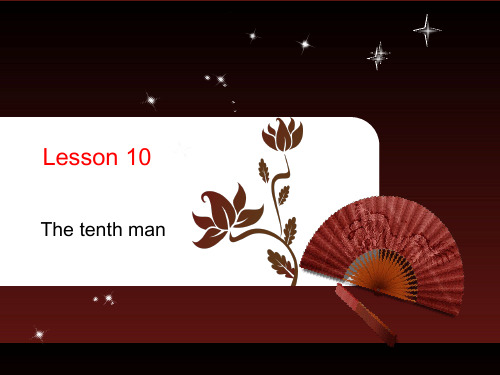
• mock : fun of 嘲笑。 • His writings mocked the follies of the age. • The naught boy mocked his queer accent. • His irresponsibility mocked my trust in him.
park every weekend . • 2.He is bound to come .
• I want you to hold this watch for me in case... • in case : in the event of • 万一 • 1. You'd better take the umbrella with you in
• v. give up or lose for some good purpose 牺牲 e.g.: He sacrificed his life to save the child from the fire .
• We are quite indifferent as to which three. • indifferent : having no interest , not caring for • indifferent to :对...不感兴趣,漠不关心 • e.g.: 1.He is quite indifferent to the picnic this
time . • 2.How can you be indifferent to the crisis?
• we see through that • see through : not be deceived by 看穿
• e.g.: 1. The soldier saw through the enemy's little game.
高职英语听说课讲课稿范文

高职英语听说课讲课稿范文Good morning, everyone. Today, we are going to focus on enhancing our English listening and speaking skills, which are crucial for effective communication in both academic and professional settings. In our globalized world, strong English proficiency can open many doors, and through today's lesson, I aim to provide you with practical tools to improve these skills.Listening Activity:First, we will begin with a listening activity. I will play an audio clip of a conversation between two individuals discussing their weekend plans. I encourage you to listen carefully to the dialogue. After the audio finishes, I will ask you a few comprehension questions to check your understanding. This exercise will not only help improve your listening skills but also familiarize you with differentaccents and intonations, which are essential for real-life conversations.Discussion:After the listening activity, we will break into small groups to discuss what you heard. Each group will share the main points of the conversation and their opinions on the weekend activities mentioned. This peer interaction will give you the chance to practice speaking in a supportive environment, allowing you to articulate your thoughts and ideas clearly.Speaking Activity:Next, we will move on to a speaking activity. Each student will prepare a short speech about their favorite hobby or interest. You should aim to include details about why you enjoy this hobby, how you got started, and any interesting experiences related to it. After you present, we will have a Q&A session where your classmates can askquestions. This format encourages not only speaking but also active listening and engagement with your peers.Role-playing Exercise:To further develop your skills, we will conduct a role-playing exercise. I will assign different scenarios such as interviewing for a job, ordering food at a restaurant, or resolving a conflict. Working in pairs, you will act out these scenarios, focusing on using appropriate vocabulary and expressions. This practice will enhance your ability to think on your feet and respond appropriately in various situations.Conclusion:In conclusion, proficiency in listening and speaking is fundamental for communication in English. Today, we engagedin activities that cater to both skills, providing you with opportunities to practice and receive feedback. Remember, the more you practice, the more confident you will become in using English in everyday situations. I encourage you tocontinue practicing these skills outside the classroom by engaging in conversations, listening to English media, and participating in discussion groups. Thank you for your attention, and let's make the most of our practice sessions together!。
高级职业英语期末复习网上教学记录资料秋

《高级职业英语》期末复习网上教学记录资料(秋)( 12 月26 日)刘黛琳: Welcome to join the discussion!问: 延庆电大。
听力如何备考常凤艳: about preparation for the listening testHi there,Really glad to see you here. As for how to prepare for the listening test, I have some suggestions here. First study the sample test very carefullyand get familiar with the forms the test types.Secondly pay attention to all the listening activities and try to familiarize yourself with the instructions. For the less time you take listening to the instructions, the more time youget in reading the test items. Reading the items before youlisten to the passage is very important.This is because it can help you to get some idea about what the listening passage will be about. Therefore, you'd better try to find yourself some time to read the instructions before you start listening.Good luck!问: 湖南电大。
《高级职业英语》教学辅导(第1单元).doc
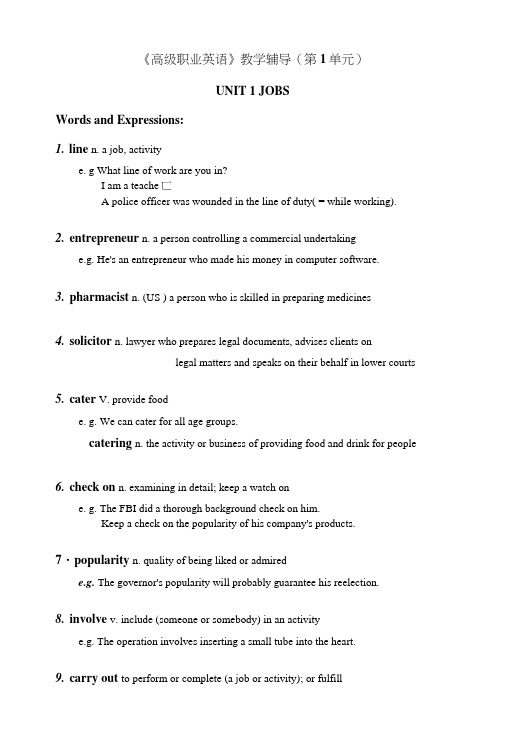
《高级职业英语》教学辅导(第1单元)UNIT 1 JOBSWords and Expressions:1.line n. a job, activitye. g What line of work are you in?I am a teache匸A police officer was wounded in the line of duty( = while working).2.entrepreneur n. a person controlling a commercial undertakinge.g. He's an entrepreneur who made his money in computer software.3.pharmacist n. (US ) a person who is skilled in preparing medicines4.solicitor n. lawyer who prepares legal documents, advises clients onlegal matters and speaks on their behalf in lower courts5.cater V. provide foode. g. We can cater for all age groups.catering n. the activity or business of providing food and drink for people6.check on n. examining in detail; keep a watch one. g. The FBI did a thorough background check on him.Keep a check on the popularity of his company's products.7・ popularity n. quality of being liked or admirede.g. The governor's popularity will probably guarantee his reelection.8.involve v. include (someone or somebody) in an activitye.g. The operation involves inserting a small tube into the heart.9.carry out to perform or complete (a job or activity); or fulfille.g. I was elected to carry out a project.10> transaction n. buying or selling thingse.g. This was the biggest estate transaction in the city's history.11. make v. be or become (something), esp. by having the necessary characteristicse. g. I don't think he will make a good lawyer.12< outgoing adj. friendly and willing to meet new peoplee. g. a very outgoing person13.optimistic adj. thinking of the good part in a situation rather than the badpart, or feeling that in the future good things are likelier tohappen than bad thingse.g. Pm optimistic that we can work out a solution.14.intrepid adj. very brave and willing to risk being in a dangerous situatione. g. An explorer must be very intrepid.15.original adj. different from anything or anyone else and therefore new andinteresting.e.g. Our teacher said that we'd better come up with something original ・16.get worn out to get extremely tirede. g. We got worn out after our long walk.17・ be quick on the uptake to understand quicklye. g. Mary is quick on the uptake when learning computer.18< n A H level advanced level (in the UK), a GCE examination of a standardhigher than "ordinary level and GCSE"GCE—General Certificate of EducationGCSE一General Certification of Secondary Education19< retail n. the activity of selling goods to the public, usually in smallamounts, for their own use20. on the grounds that becausee.g. He refused to answer on the grounds that he promised to keep it secret. on thegrounds of (something) = because of (something)e.g. Please excuse him on the grounds of his youth.Vocabulary Exercise:1. Give the Chinese version to the following words1)to put out fires ____________________2)to rescue people __________________3)to assemble table lamps __________________4)an observant writer __________________5)to teach geometry __________________6)get frustrated __________________7)full-time job __________________8)part-time job __________________9)working hours ____________________10)a hair stylist __________________11)space-saving style __________________12)domestic duties___________________13)outgoing mail ____________________14)incoming mail ___________________15)run the office ____________________16)deal with routine telephone calls ___________17)confirm appointments ___________________18)scattered-brained __________________19)quick on the uptake __________________20)bio-data __________________21)check-out till _________________22)move stock ___________________23)work on an hourly basis __________________24)pursue one's ambition __________________25)place orders __________________26)do a course _________27)shift manager __________28)entrance test __________29)paramedic course _________KEY:WritingWrite a curriculum vitae of yourself according to the sample and type your workSample WritingName: Sheila Homer Date of Birth: 18/4/1959 Nationality: British Marital Status: Married Present Occupation: Operational shift Manager for the Clifton Ambulance Service Responsibilities: Providing ambulance service, allocating overtime, sorting ort wages, checking copies of patient forms.EDUCATIONqualificationDiploma in Secretarial course Certificate CertificateWORKING EXPERIENCE1977—1982 1985一present Secretary in Clifton Carpet FactoryOperational Shift Manager in Clifton Ambulance ServiceINTERESTS:Music, traveling, stamp collecting REFEREESMr. David Williams (Manager) &M FS . Ann Smith (Director)I ) 灭火 2)救人 3)组装台灯 6)受到挫折7)全职工作 8)兼职工作 4)善于观察的作家 5)教几何15)管理办公室 19)理解得很决 16)处理日常电话 20)个人情况 24)实现理想 9)工作时间 13)要发出的信函 17)确认约会21)收银台10)发型师 14)收到的信函 ⑻精神不集中的22)整理货物 26)学习一门课程 29)医务辅助人员课程 30)幽默感Years1975—1977 1984—1985 1989—1990course/ institution Clifton Technical collage Accident and Emergency Paramedic Course。
高级时事英语--课程教学大纲

高级时事英语--课程教学大纲一、专业课程设置原则及设计思想1.教学对象及其特点本课程的教学对象为已具有大专学历的成人学生。
工作、自学和家庭责任三者相互争时争力的矛盾,是本教学对象不同于常规教育对象的显著特点。
2.教学方式本教材采取的是远距离教学方式。
该方式的优点是:⑴费用低,覆盖面大;⑵克服了因时、空间给学生带来的求学障碍;⑶在岗学习,工作与学习兼顾;⑷人才获训而不流失。
该方式也有内在的缺陷,如师生无法进行当面交流;学生难以及时得到教师的帮助和反馈等。
课程设计以教学对象为中心,充分发挥远距离教育的优点,努力克服其缺点,根据教学对象的特点,开创一条适合自学的新的教学思路。
3.课程设置与教学方法3.1 课程设置按主题编排教程。
总课程分两个模块:英语语言交际模块和专业倾向模块。
语言交际模块包括日常生活、休闲、工作、时事、写作、跨文化交际、英语世界和文学欣赏八个主题,以及两个学习指南。
专业倾向模块包括英语教育、经贸、翻译三个倾向,以及针对不同专业倾向的学习指南。
3.2 教学方法通过远距离实施交际教学法,关键要做到两点: 一是把教师在课堂上、课前和课后的各种活动,如反馈、咨询、答疑、鼓励和其他帮助等溶化到教材中去;二是把培养学生的自发、独立治学的精神和方法熔于教材中,编写学生学习指南,以帮助学生养成自我管理、自我约束的习惯。
3.3 五项技能合一,进行综合训练目前用于语言技能训练的教科书把听、说、读、写、译分册编写,这样做是缺乏语言习得理论基础的,在语言习得实际过程中五项技能是不可分的,是互相影响和互为补充的。
对于远距离学习者来说,由于整块时间少,课型多容易造成忙乱,不利于自学安排。
鉴于上述考虑,应采取五项技能合一,综合训练,有所侧重,即每册教材、每个单元都涉及五项技能,教材之间所不同的是侧重点,而不是技能差异。
这样做既符合语言习得的实际过程,也有利于学生自学安排,可以专心致志于单元学习。
英语语言交际模块各门课程中五项技能训练分布表:* 表示侧重的程度,*号越多侧重程度越大; # 表示一般要求,不是重点。
- 1、下载文档前请自行甄别文档内容的完整性,平台不提供额外的编辑、内容补充、找答案等附加服务。
- 2、"仅部分预览"的文档,不可在线预览部分如存在完整性等问题,可反馈申请退款(可完整预览的文档不适用该条件!)。
- 3、如文档侵犯您的权益,请联系客服反馈,我们会尽快为您处理(人工客服工作时间:9:00-18:30)。
《高级职业英语》、《高级时事英语》考前复习串讲课程讲稿
主讲:李晨
一、课文框架纵览
(其中标红部分为口语考试需着重复习的单元,复习方法请听“口语考前集训营”第四期和第五期的录音回放:
第四期:节目回放节目大纲
第五期:节目回放节目大纲)
1.高级职业英语
课程目标:
1)工作中的8个主题展开英语综合技能的训练;
2)听说读写技能,尤其注重英语听说能力的培养;
3)了解英美等英语国家职业的文化特征。
2.高级时事英语
课程目标:
1)时事生活中的8个主题;
2)听说读写技能,尤其注重英语读写能力的培养;
3)了解英语国家宣传媒体的几种常见形式,体会新闻英语语体的一些特点,掌
握有关时事报道的听力技巧。
请注意,针对听力和口试题,
《高级职业英语》中如下页码中的听力材料必须听懂并理解:
P49-51; P103-104; P154-155; P197-199; P275-277; P329-331; P369-371
《高级时事英语》中如下页码中的听力材料必须听懂并理解:
P50-51; P117; P170-172; P233-234; P284-285; P334-335; P382-383; P427
二、试题框架简述
《高职》、《高时》的笔试均包括三部,各部分分值和时间分配如下——Section I: Listening Test (25 points, 30 minutes)
Section II: Reading Test (50 points, 60 minutes)
Section III: Writing Test (25 points, 30 minutes)
两门考试均有样题,可供熟悉试题框架和模拟测试用,具体的试题位置见下图(图1&图2):
图1
图2
三、答题技巧点拨
1. Section I. Listening Test:满分:25分
题型:multiple-choice; table-filling or blank-filling ; true/false judgment
听力材料类型:会话,mini-presentation/monologue
听力放两遍。
材料来源:一个来自课本, 其余教材以外
再次提醒各位注意,针对听力和口试题,
《高级职业英语》中如下页码中的听力材料必须听懂并理解:
P49-51; P103-104; P154-155; P197-199; P275-277; P329-331; P369-371
《高级时事英语》中如下页码中的听力材料必须听懂并理解:
P50-51; P117; P170-172; P233-234; P284-285; P334-335; P382-383; P427
听力部分考生犯的错误:
1)不会正确拼写单词:
2)语法不过关:遗漏关键词缀:举个例子,听到marketing,但写成market,ing 没写,名词后该有复数s的漏掉了。
Varies的变形vary, various。
3)听力欠准确:数字听错,比如21听成20;明明是短语,但没有写相应的介词或副词,如taken up写成taken。
4)有些错误表明学生没听懂/理解上下文的意思,如:bonding写成ponding, vocation –location;comfort-complete, compact, conflict;
5)信息搞混淆:比如attended a meeting with the Marketing Department. 对话中也提及了services department, 有的同学就写services;
这种令人遗憾的错误表明这些同学没有顾及句子的语法结构。
所以,在需要填写单词的试题部分建议大家不仅要将注意力放在所填的单词上,还有考虑整个句子的语法结构或上下文,这样不仅可以排除干扰项,避免语法错误,有时还能从上下文中得到线索,对答案进行合理的猜测。
6) 填答案时填错行:比如不会做第五题,却把第六题的答案写上去,造成后面的答案跟着错。
Tips: 建议听第一遍之前利用30秒快速浏览题目内容,大概了解主题、需填写的信息。
第一遍听力求听懂大意,记住难点、疑点,听下一遍时更加注意;尽量写简写。
2.Section II. Reading Test: 满分:50
《高职》共5篇阅读篇章。
《高时》共4篇阅读篇章。
文章篇幅平均400字/篇
两门试题中各有一篇选自教材,其余选自课外
课外的篇章中生僻单词标注了中文含义,课内的文章没有任何中文注解
阅读题题型分析和答题建议:
1)事实题:题干里提到什么,就到原文里含有这些文字的句子周围找答案,这样做快且准;
2)词汇题:利用上下文语境、定义解释,如that is, namely, which is, …is called; 标点,常识,举例,同义词、反义词、同位语、词缀等;
3)判断题:要求理解文中未被直接表达的观点、内容,e.g.作者的态度、情绪。
Tips:作者的态度与文章的中心思想是一致的。
注意:
A. 题目表述中有无all, never 等绝对意义的词,因为这种说法往往都是错误的;
B 事实题注意细节:究竟多少?具体在什么地方?
C当心题干中否定或排他意义的词,以免回答反了,如not, except, but,
D 注意not mentioned(在要求判断的10个句子中,属于这种的一般不多,应在数量上控制。
)
4)主旨题:要求概括出文章的中心思想,题干中往往有关键词如main idea, major point, mainly deals with, purpose of the article, the best title等。
Tips: 建议把各小段的主题合起来;注意表转折、让步的专承连词及句式,因为专承、让步的主句通常是作者要强调的部分;通过具体的例子、统计数字及引语等论据进行判断。
5)简答题: 注意言简意赅,同时必须给的几个点或因素也不能少。
一定不要只是机械地把文中文字抄下来,要总结核心意思。
6) 排序题
段落排顺对很多同学而言都是非常棘手的题项。
该题主要考察对篇章结构和内部逻辑的判断和领悟能力。
所以在做这类考题时,一定要先仔细地阅读全文,特别要关注每个段落的起始句和终结句,因为它们往往起着承上启下的作用,从中可以判断与该段相关的上一段落和下一段落的大致内容。
另外,英语文章一般会遵从一定的逻辑关系,如时间顺序、空间顺序、因果顺序等等。
考试中出现最多的是论述文,此类文章的内部逻辑往往是指出问题、描述
问题、分析原因、提出建议或得出结论。
只要按照某种逻辑关系去排列段落,你一定会感到原先棘手的题项也变得迎刃而解了。
为了提高对文章逻辑关系的领悟与把握,建议在平时的学习中可以做如下练习:复印或打印一篇未读的英语文章,用剪刀按照段落将其剪开,并将顺序打乱,然后在规定的时间内将段落重新拼接在一起,最后与原文对照。
文章的字数、难度和完成的时间可以参考该门课程终结考试的样题。
3.Section III. Writing:满分:25分
评分标准:书写2;语言13;内容10
写作考试的题目或与课程中某一个单元主题相关,或与某一单元中写作练习的体裁相关,所以认真对待每单元的写作作业和老师的评语就显得尤其重要。
就学生以往考试中的表现来看,主要问题依然集中在内容和语言两方面。
虽然题项说明中已经提示了作文应包括的要点,有些同学也按照要求逐点分段来写,但在每段的论述中,内容空洞单薄,缺乏具体的实例支持论点。
段落内部的语句之间也缺乏清楚的逻辑关系。
语言层面的问题主要为:
1)选词不当:
例如,“引人注意”的英语对应词可以是“to catch people’s attention”, 但如果用“to arouse public concern”就不合适了,因为它的中文含义是“引起公众的关注或担忧”。
同样,“炫耀”用“to show off”来对应就比用“to promote”
更合适;
2)句型混乱:
主要表现在各个从句之间仅用逗号连接,而没有按照语法规则使用恰当的连词或关系代词衔接。
针对上述问题,建议同学们在进行英文写作时,要按照英语的行文习惯来组织内容,即每个段落用主题句指明论点,用例子支持或解释阐明论点,并以结论句结尾,回应或强调段首的论点。
还有就是在平时的学习中留心单词和短语的用法和新颖的句型,避免作文时感到“巧妇难为无米之炊”。
建议:
1)首先看清体裁:书信、简历、叙述、继续、议论文?
2) 书信、简历:注意格式
3)议论体裁的作文一定要写thesis statement,表明自己的立场、观点,这样结构显得较清晰。
注意:规定使用的词汇少于8个的每个扣0.5分。
四、单元重点汇总
复习之前,建议先把握这门课程的单元重点,因为课程终结考试就是围绕这些要点来出题的。
这个复习要点资源提炼出了课程各个单元的重点词汇、词组/句型和文化知识点,强烈建议你结合上下文来掌握这些词汇、句型结构的用法,而不是孤立地、机械地去背单词、记短语。
